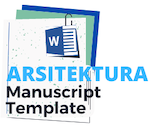Pengembangan Taman Kota dengan Outdoor Coworking Space Pasca Pandemi Covid-19
Abstract
In the state of the covid 19 scourge currently sweeping the world, adaptation is a concern for any element especially in public activity space and room. This study addresses to obtain research results regarding an urgency of need for public space with all its elements and facilities that support productive culture of students & workers in the industrial world 4.0, especially in Indonesia. This study uses descriptive qualitative methods with analysis of field observations, questionnaires, descriptive, and literature studies. The statistical method used is using ordinal variable measurement. These results and research are the basis that it is necessary and urgent of outdoor coworking space to carry out further and in-depth research on contextual and cultural appropriateness so that it is appropriate to be applied and become a support in Indonesia's preparation to compete with the global world in the 4.0 Industrial Revolution Era and post-covid adaptation of social interaction in Nganjuk City Park.
Keywords
Full Text:
PDFReferences
Daintith, J., & Wright, E. (2008). Dictionary of Computing (6 ed.). Oxford: Oxford University Press.
Djunaedi, A. (2002). Petunjuk Penulisan Usulan Penelitian dan Tesis. Yogyakarta: Program Pascasarjana Magister Perencanaan Kota dan Daerah UGM.
Hashemnezhad, H., Yasdanfar, & Seyed A. , e. (2013). Comparison the Concepts of Sense of Place and Attachment to Place in Architectural Studies. Malaysia Journal of Society and Space, 9 (1), 107-117.
Hermann, M., Pentek, T., & Otto, B. . (2016). Design principles for industrie 4.0 Design principles for industrie 4.0. 49th Hawaii International Conference, (pp. 3928-3937).
Leforestier, A. (2009). The co-working space concept. Ahmedabad: CINE Term Indian Institute of Management (IIMAHD).
Marinelli, P., Cleary, N., Worthington-Eyre, H., & Doonan, K. (2010). Flexible Workplaces: Achieving the worker's paradise and transport planer's dream in Brisbane. 3rd Australasian Transport Research Forum (ATRF) . Canberra, ACT.
Mehta V. (2007). A toolkit for performance measures of public space. 43rd ISOCARP Congress . Antwerp.
Neugebauer, R., Hippmann, S., Leis, M., & Landherr, M. (2016). Industrie 4.0-From the Perspective of Applied Research. Procedia CIRP, Vol. 57, pp. 2-7.
Nieuwenhuijsen, M., & Khreis, H. (2019). Integrating Human Health into the Urban Development and Transport Planning Agenda: A Summary and Final Conclusions. doi:doi:10.1007/978-3-319-74983-9
Rüßmann, M., Lorenz, M., Gerbert, P., Waldner, M., Justus, J., Engel, P., & Harnisch, M. . (2015). Industry 4.0: The future of productivity and growth in manufacturing industries. Boston: Boston.
Schwab, K. (2016). The Fourth Industrial Revolution. World Economic Forum.
Sulistiuani, A., & Rosidah. (2003). Manajemen Sumber Daya Manusia. Makassar: Raja Grafindo Persada.
Tjandrawina, R.R. . (2016, April). Industri 4.0: Revolusi industri abad ini dan pengaruhnya pada bidang kesehatan dan bioteknologi. Jurnal Medicinus, Vol 29 No.1.
Velarde, M.D., Fry, G., & Tveit, M. (2007). Health effects of viewing landscapes - Landscape types in environmental psychology. Urban Forestry and Urban Greening 6. doi:doi:10.1016/ j.ufug.2007.07.001
Zuchdi, D. (1995). Pembentukan Sikap. Cakrawala Pendidikan. 3 Tahun XIV.
Refbacks
- There are currently no refbacks.










